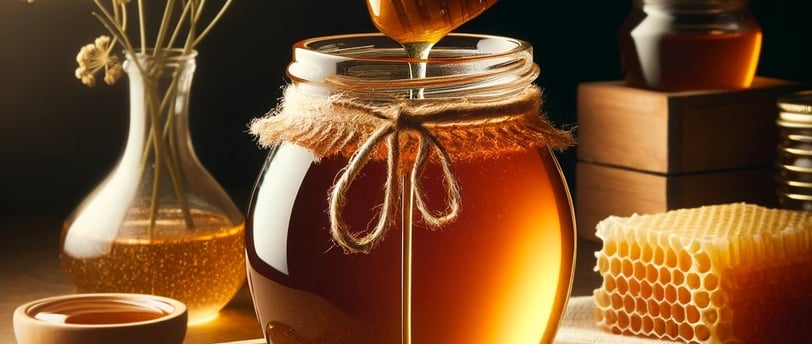The Sweet Truth About Honey
Nectar or Nemesis?
FOOD


Honey – this golden elixir has been drizzled over our lives and diets, stirring a buzz of debate. Is it a superfood or a sweet trap? Let's dive into the sticky details and unmask the truth about honey, one sweet spoonful at a time.
Honey: A Pot of Gold or Just Sweet Talk?
The composition of honey is a marvel of nature – a complex blend of up to 180 different components, thanks to the industrious bees that gather it from a variety of flowers. This diversity not only makes honey delicious but also infuses it with a plethora of health benefits. It's not just about fructose and glucose; there's a whole bee dance of phenolic acids, antioxidants, and micronutrients happening in there.
Honey: A Healer and Protector
Honey isn't just a sweet treat; it's a medicinal marvel. Its antifungal and antitumoral properties are not just folklore but scientifically substantiated claims. It's been observed to play a role in various stages of cancer development, promoting apoptosis (cellular suicide, if you will) and impeding angiogenesis (the process by which tumors vampirically grow new blood vessels). Besides, it's a fierce warrior against free radicals and oxidative stress, offering a protective shield to your nervous, cardiovascular, and immune systems.
The Sweet Spot for Digestive Health
Struggling with gastritis, ulcers, or the pesky Helicobacter pylori? Honey comes to the rescue. It's like a gentle balm for your gut, battling against infections and even intimidating E. coli and salmonella. And if you've ever suffered a wound that just won't quit, honey's antiviral, antifungal, and antimicrobial properties make it more than just a pantry staple – it's a first-aid kit essential.
Honey and the Great Cholesterol Conundrum
Honey doesn't just sweeten your tea; it sweetens your health profile too. It plays a dual role in the cholesterol saga, raising the HDL (the good guys) and lowering the LDL (the villains in your vascular narrative). And for those nocturnal coughs in children, honey might just be more effective than your over-the-counter syrup.
Honey: A Friend or Foe for the Fitness Fraternity and Diabetics?
For the gym enthusiasts and calorie-burners, honey is like an energy potion, combating fatigue and oxidative stress, and offering a premium fuel for workouts and active play. However, for diabetics, it's a bit of a grey area. Despite being a natural sugar, its high carbohydrate content makes it a cautious choice. It might be better than refined sugar, but it's still sugar.
A Plant-Based Twist in the Honey Tale
Interestingly, the most potent and beneficial components of honey – flavonoids and phenolic acids – are plant-derived. This brings us to an intriguing point: if your diet is rich in plants, fruits, and vegetables, you're probably already scoring these nutrients. So, is honey just gilding the lily?
Honey: Not Just Another Spoonful of Sugar
It's important to note that honey is not a one-to-one substitute for sugar. Its unique composition and health benefits set it apart. But let's not forget, healthier options like legumes, vegetables, fruits, and whole grains offer fiber and essential nutrients without the sugar rush.
To Drizzle or Not to Drizzle?
So, should you embrace honey with open arms or approach it with caution? Like everything in life and nutrition, moderation is key. A spoonful of honey can make a world of difference to your health, but a jarful might just tip the scales in the wrong direction.
Honey: A Sweet Conclusion
In the end, honey isn't just a sweetener; it's a story of nature, health, and a dash of mystery. Whether it's drizzled on your breakfast, mixed into your tea, or applied to a stubborn wound, honey has a place in both your kitchen and your medicine cabinet. So, the next time you reach for that honey jar, remember, it's more than just sweetness – it's nature's golden gift.



